Disability Rights Defenders Newsletter December 2021
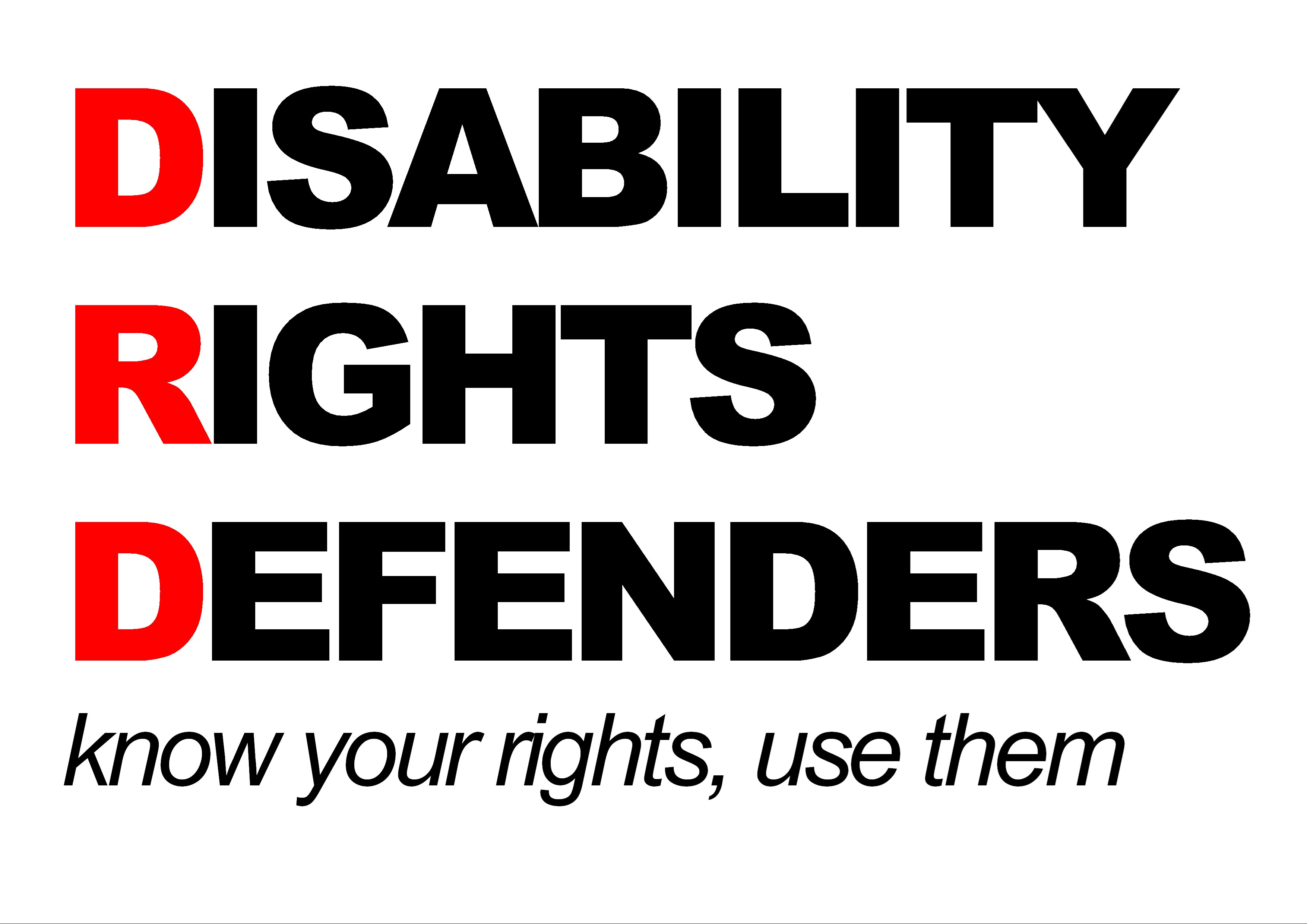
This Disability Defenders Network Newsletter is dedicated to Kapka Panayotova
Jamie Bolling
DRD Newsletter December 2021 – content of the newsletter
- Dedication to Kapka Panayotova – a great Independent Living activist
- Kapka Panayotova – A Champion for Inclusion with a Deep Sense of Justice – By Steven Allan Co-executive, Director Validity Foundation
- Taking the European Commission to Court - Ines Bulic Cojocariu, Deputy Director, European Network on Independent Living
- Kapka Panayotova and disabled people’s struggle for naming and meaning - Teodor Mladenov, Senior Lecturer at the School of Education and Social Work, University of Dundee
- Kapka Panayotova’s fight for Personal Assistance in Bulgaria – Lilia Angelova
- Kapka and the ENIL DI study visit to Stockholm 2016
- Kapka and TRIPS
- Meeting of the DRD Nordic Network – Save the date!
- Your ideas for DRD planning
- Closure by Gerard Quinn – UN Rapporteur
Dedication to Kapka Panayotova – a great Independent Living activist
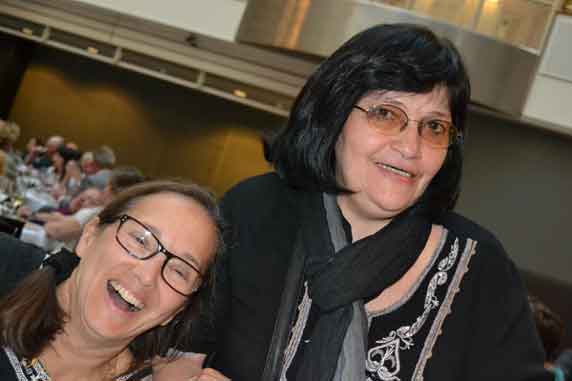
This Disability Defenders Network Newsletter is dedicated to Kapka Panayotova, from Bulgaria, who in October unexpectedly left this world, leaving us in the Independent Living movement in shock. Kapka was a great leader and activist pushing for a better world for we disabled people. She founded the CIL Sofia in the 80s and has ever since committed her life to promoting Independent Living. Personal assistance, de-institutionalization and accessibility were just some of the issues for which she carried a torch. All of which are important to access Independent Living.
I, Jamie Bolling, remember her convincing the ENIL board, when she was the ENIL Chair and I was the director, on how we needed to formulate our definitions for independent living, personal assistance, deinstitutionalization and community-based services as she was angered on how the terminology was being high-jacked and used with other meanings than that of Independent Living. This was 2012 and the definitions still needed as the high-jacking continues can still be found on this link: https://enil.eu/independent-living/definitions/
Kapka was a great friend for many of us. She was also a mentor. She is known for her sharp tongue and conviction making leaders aware of how they were mistreating disabled people and abusing our rights. She saw the movement in Bulgaria grow from herself to an organization that could have 50 to a hundred wheelchair users gathered for demonstrations. I attended some of these demonstrations and experienced how organized the work was and the effective efforts used to reach Bulgarian politicians. The messages heard, though the efforts have many times been lost on the way with excuses on lack of funding and others. These politicians, social workers and other leaders live with their conscience and Kapka died with hers, knowing she did everything she could to promote Human Rights fighting until her last breath.
I include here a remembrance written by Vibeke Marøy Melstrøm, another great leader of our movement. Vibeke is one of the founders of the Independent Living movement in Norway and presently the Secretary General of Uloba – Independent Living Norway.
Europe has lost a powerful voice and a great lady!
It was with sad regret and shock that I received the message of Kapka’s death on Oct 14th. With her passing we have lost an important champion for human rights and equality and a very dear friend, far too early.
Kapka was one of the Independent Living movements' most dedicated activists, hard working and responsible. Kapka was the founder of the Center for Independent Living Sofia and a great fighter for disabled people all across Europe.
Her spirit and strength, her powerful voice and warm heart inspired us all!
Kapka had human dignity and civil rights in her blood: a view of humanity shaped by the many ups and downs in her own, and her friends’ life. She was very clear on what she thought an equal and dignified life should be and she worked tirelessly for others to help them achieve this.
We met through our joint work for ENIL – European Network on Independent Living. Our totally different backgrounds quickly became a common platform for mutual understanding and made us united in our fight for equality and human rights both in our own countries and across Europe. Both becoming Presidents in ENIL became a formal manifestation of that common purpose.
I learned a lot from Kapka both as an Independent Living-activist and as one of my great role models. She was strong, with a distinct and radical voice. At the same time, she was inclusive, warm, and caring. She became an advocate for those who could not speak up for themselves. And she always took responsibility, whether at a compassionate level or an organisational level. In particular, she spearheaded multiple projects, not only in Bulgaria, but across large parts of Eastern Europe. In this way, she helped turn ENIL into a major player whose voice could be heard all across Europe.
She had strong convictions, never let herself be intimidated by any authority, and was unwavering in her commitment. Both at Uloba, where I am Secretary General, and in ENIL, we were inspired by her dogged determination and unyielding perseverance to build a future based on respect and equality – for all. Her approach was informal, but she commanded respect and was listened to by all those she met. Kapka played a key role in the breakthrough for our ideology on equality for disabled people.
When I look back at countless Independent Living-conferences and demonstrations, especially in Strasbourg and Brussels, Kapka is at the heart of those memories. The reverberations of her words will be heard in the streets during future Freedom drive parades.
Kapka was one of the Independent Living movement`s great leaders! We have indeed lost a true warrior and we will miss her when we gather again on the battlefield.
The echo from her words will remain in our hearts…
I shine a light on Kapka’s memory.
Kapka Panayotova – A Champion for Inclusion with a Deep Sense of Justice
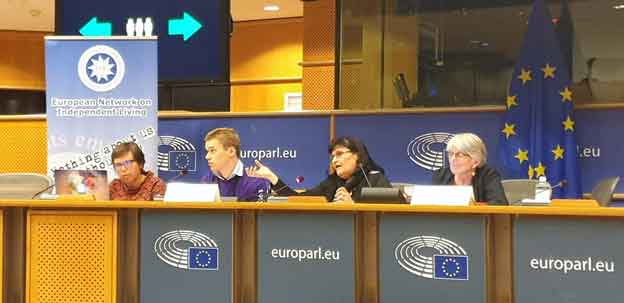
It is both an honour and a challenge to write this piece, in memory of Kapka – our indefatigable friend, colleague, co-conspirator and true warrior. Difficult to write because it is hard to imagine that Kapka is no longer with us on the front lines. Whether we were up against the nonchalant dismissiveness of corrupt politicians, or the collective might of the European Commission, Kapka will rightly be remembered as a fearless champion for the rights of persons with disabilities who would never blink before leading the charge. As many of us came to know, Kapka was at once fearless, yet deeply humane – deeply human – bringing not only heart to the mission, but providing a soul to the independent living movement in Bulgaria, across Europe and far beyond. Most importantly, Kapka’s kindness will stay with me; kindness is one of the highest of human traits, and Kapka had overflowing buckets of it – she never just talked about inclusion, but she lived by this principle, often at great personal cost.
Kapka will go on to be both a personal and professional inspiration, notwithstanding her untimely departure from us all. I can almost hear her impish cackle at our sorrowful mourning and obituaries. I have no doubt she would be quickly shift the focus, demand that we pick ourselves up and push for us to get on with the job at hand: “Can’t we bloody do something about that?”
My team and I were privileged to experience the full force of Kapka-the-doer. Indeed, in recent years, a small number of us have been doing everything in our power to end the outrageous policies of those within the European Union who think it is acceptable to continue spending millions of Euros of European tax-payers’ money on keeping people with disabilities locked up in institutions. Old approaches die hard, and Bulgaria really is a front-line in his respect – proudly holding up its EU-financed model of ‘deinstitutionalisation’ as an example to the world. And yet, the whole shambles is premised on keeping people with disabilities locked up in so-called “group homes”, denying people with disabilities the personal assistance and support they have a right to receive in order to live and thrive in the community.
This incensed Kapka until her final moments, and I know from many discussions that it offended her sense of justice. How on earth can we still be spending countless millions to keep people locked up and locked away for life? It offends me too, which is perhaps why we got on so well, and why our organisations were such natural partners.
That shared anger, and that uncompromising belief that things must change is what led to the Centre for Independent Living in Sofia, joining the European Network on Independent Living and our team here at Validity in launching the first ever case challenging the European Commission before the European Court of Justice for allowing millions to be spent on new golden cages for Bulgarians with disabilities. Sorry, I mean “family-type placement centres”, “group homes”… or whatever the currently-fashionable term now is. Of course, the European Commission knew us well as being loud and critical for years on this issue, but I don’t think they really believed we’d get the issue into the courts. But that is precisely what we did, with Kapka’s assiduous support, backed up with her top-class research. In taking the case, we proved that we could both march on the streets (as some of us fondly remember doing alongside Kapka at the Freedom Drive in Brussels) and could also march straight into the courts.
I have to say, there were many nay-sayers who told us it was impossible, or even undesirable, to try to sue the European Commission when they refused to stop millions of Euros flowing into the discredited “group home” model in Bulgaria. Even some allies in the broader disability rights movement told us it was a wrong decision. “How will you feel if they stop all the money?” I remember us being asked. “How do you feel about EU money being used to lock us up?”, I seem to remember Kapka striking back. And so, we had an important point to prove with this case: if you pay for institutions, you are responsible for human rights violations. And our message to the European Commission was simple: if you allow Member States to spend EU money on keeping people with disabilities in institutions, then we will pursue you, if necessary, through the courts.
After a long process of litigation, and sterling pro bono support from lawyers at Covington & Burling, I’m sorry to say that we lost the case on appeal. Defeat – something that Kapka would never take lying down. But as the old saying goes: we may have lost the battle, but certainly not the war. And, in fact, we achieved a much more important victory through taking the case. We proved the nay-sayers and the Brussels elite that, yes, we can and will bring you to court and shall never be silenced when people with disabilities are having their lives taken away from them. There are already important ramifications emerging from this inspiring piece of legal activism. We see subtle hints that dismissive European Commission staff are beginning to ask more questions when countries propose to build yet more institutions. And while progress often feels painfully slow, the shine has most certainly gone off the famed ‘Bulgarian model’ of deinstitutionalisation; perhaps because there are European Commission desk officers who are not very keen on having to testify in court about their so-called benefits. Beyond this, the case has also taught us some crucial lessons about how to construct future claims, with significantly higher chances of success.
“Institutions are no solutions: Free Our People!”
As I close off this piece, I can still hear Kapka’s loud voice in my mind, husk from both her activism and the chain-smoking that comes with a life dedicated to activism in all its senses. On behalf of Validity, I would like to say that it has been our honour to be your colleague. And on a personal level, let me thank you again for your kindness, but also for your radicalism. It is precisely your radical streak, and your deep sense of justice, that will continue to inspire me and many others for a very long time to come.
Yes, dear Kapka, we can do something about it! And keeping you warmly in your hearts, I promise you that we will continue fighting, for as long as it takes.
Steven Allen
Co-Executive Director
Validity Foundation – Mental Disability Advocacy Centre
Budapest, 8 December 2021
Taking the European Commission to Court
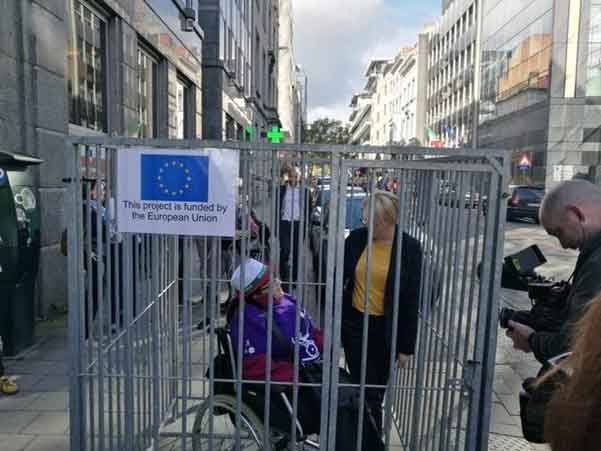
Ines Bulic Cojocariu, Deputy Director, European Network on Independent Living
At the European Network on Independent Living – ENIL, we started monitoring how EU funds were used around 2007, in the framework of the European Coalition for Community Living - ECCL. We were among the first organisations to do so, after learning from NGOs in Romania how large institutions were being renovated using EU funds. Coming from Bulgaria, Kapka Panayotova was an immediate ally, as she recognised the same issues in her country and found this to be something we need to expose and fight with all our strength.
The same year, in 2007, "Bulgaria’s Abandoned Children" was released, showing the appalling conditions and abuses in a children’s institution in Mogilino. This documentary attracted a lot of attention, including of the European Commission officials, who suddenly realised that renovating institutions was not such a good idea. At the beginning, there were a lot of positive developments, with the importance of closing down institutions high on the European agenda. Soon, things started happening, and EU funds were poured into the reform of Bulgaria’s child protection system.
With Kapka, we followed this process closely. I remember being in the European Parliament, where the documentary was shown, with Kate Blewett and Laura Parker, who used to work for the EU delegation in Bulgaria, and later happened to share the office with CIL Sofia. She also was an ally.
Unfortunately, what would for years be described as a "success story", turned out not to be so good for disabled children from these large institutions. For them, hundreds of "family-type" homes were constructed and they were simply moved from large institutions into smaller ones. The fact that everyone was turning a blind eye to this, including mainstream children’s rights organisations and UNICEF, was a great cause of anger and frustration for ENIL and CIL Sofia. As Kapka kept pointing out at every opportunity, especially high-level events, Bulgaria was anything but a good example of deinstitutionalisation. People like to think that what they have done was worthwhile, so this was a truth no one wanted to accept. In one meeting, disabled children were referred to as simply "collateral damage".
Naturally, with deinstitutionalisation of children considered such a success, the authorities’ attention turned to adults. The same model was applied – close large institutions and build small group homes, using EU funds.
We spent endless hours strategizing with Kapka, and there is nothing we have not tried to reverse this process. Led by CIL Sofia, we submitted a petition to the European Parliament’s Petitions Committee at first. Then, when a large EU-funded call was published for the building of small group homes for adults, we decided we would try to stop it. We called on the European Commission to suspend the call.
After one particularly difficult meeting, where disabled people living in institutions were described as "having no brains" (by a relatively high ranking EU official), it was clear that there was no interest in stopping this process. In fact, there seemed to be broad acceptance of the fact that we could not expect "these" disabled people to live independently in the community.
With Kapka, we knew we had to take the European Commission to court. But, it was very difficult to find lawyers who could help us do this. Those that showed some interest did not know enough about EU law, others were simply not interested enough. Finally, with the help of Camilla Parker, we found Covington – an international law firm in Brussels - who was keen to support us. It was eventually decided that the case against the European Commission’s funding in Bulgaria would be taken by ENIL, the CIL Sofia and the Validity Foundation (formerly MDAC).
The build-up to submitting the case was both an exciting and a challenging time, made lighter by Kapka’s passion and somewhat straightforward questions during our meetings with Covington. As much as she was disliked by the authorities or the two-faced NGOs, Kapka was very much respected by everyone with a genuine human rights approach and an intention to change the status quo.
One of the major difficulties was collecting information in Bulgaria, both because of the lack of transparency, but also because CIL Sofia never had the same financial support as other "Government-friendly" DPOs. But by working together, we managed to build a strong case.
We knew it would be difficult, perhaps impossible to win, but it was such an important milestone and we could not have done it without Kapka. After the case was decided (to our disappointment, it was decided against us on procedural grounds), it was difficult to decide what to do next. The system was – still is, or seems to be – unbreakable and we are still few fighting for independent living in Bulgaria.
I am sure that, if Kapka had lived longer, we would have done so much more together. She has always motivated us not to give up, to try something new, not to take no for an answer. Still, we should not forget what we achieved together, and we owe it to Kapka to not abandon disabled people in Bulgaria, languishing in those newly built, EU-funded institutions.
Kapka Panayotova and disabled people’s struggle for naming and meaning
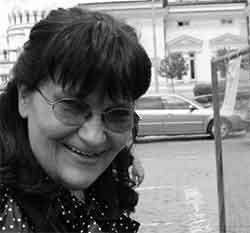
Teodor Mladenov, Senior Lecturer at the School of Education and Social Work, University of Dundee
November 2021
Kapka Panayotova (1956-2021), the late Bulgarian disability rights defender, had a deep appreciation of the power of words in disabled people’s lives. For Kapka, (re)gaining control over naming and the production of meaning was key for the success of disabled people’s individual and collective emancipation. The Centre for Independent Living – Sofia (CIL – Sofia), the leading Bulgarian disability rights organisation that Kapka founded in 1995 and directed until her sudden and untimely death in October 2021, has been involved in this fierce fight for naming and meaning from its very inception. At CIL – Sofia, we often discussed the uses and misuses of disability language in Bulgaria and considered strategies for influencing and changing this language. In these conversations, Kapka guided us with reflexivity, decisiveness and passion that had a huge impact on our own understanding of disability rights.
Two of the words that Kapka considered particularly harmful for disabled people were ‘invalid’ (in Bulgarian: инвалид) and ‘care’ (in Bulgarian: грижа).
In Bulgaria, disabled people have been called ‘invalids’ for a long time, and Kapka regarded this naming as alienating, stigmatising and demeaning. Etymologically, the word implies lack of strength, power, or worth; in addition, the term has been inextricably linked with the medicalised and paternalist approach to disability inherited from the state socialist disability policy that Kapka abhorred. Although the term ‘invalid’ was formally abandoned with the introduction of the Bulgarian Law for the Integration of People with Disabilities in 2005, it has persisted in the media and in popular usage, as well as in the discourse of the big disability umbrella organisations such as the Union of Invalids in Bulgaria (in Bulgarian: Съюз на инвалидите в България). Kapka wanted this usage of the word ‘invalid’ to end, but she envisaged this linguistic change as part of a paradigm shift in disability policy towards empowerment and independent living, rather than as a superficial substitution of one term for another in otherwise window-dressing policy documents and legislation.
The word ‘care’ was equally disliked and opposed by Kapka. Similar to other leading disability rights activists and thinkers such as Michael Oliver from the UK, Kapka considered the term ‘care’ to be patronising and disparaging when used to identify disabled people’s needs or rights. In Bulgarian, as in English, the word carries a heavy paternalist baggage, implying a hierarchy in which the ‘carer’ is empowered to make decisions on behalf of the ‘cared for’, while the latter is deprived of voice, choice and control in everyday life. In this sense, the term ‘care’ has asserted paternal and professional power and has fittingly complemented the term ‘invalid’ (as in ‘care for the invalids’ – ‘грижа за инвалидите’) in Bulgarian disability policy discourses and the popular imagination. As substitutes, Kapka promoted terms such as ‘support’ (in Bulgarian: подкрепа) and ‘assistance’ (in Bulgarian: помощ, подкрепа, сътрудничество) that imply horizontal and contractual relations between negotiating partners of equal standing. Again, Kapka envisioned such substitutions as parts of systemic and properly resourced changes rather than as surface-level window-dressing exercises, which Kapka detested as much as she detested ‘care’.
Within this struggle for naming and meanings, Kapka was very attentive to the issues of translation. Decades of experience as a professional translator and interpreter had made her acutely aware of the politics of translation and translation-as-politics. Thus, she heavily criticised the first institutional translation of the UN Convention on the Rights of Persons with Disabilities (CRPD) into Bulgarian, where the term ‘living independently’ was rendered as ‘самостоятелен живот’ (in English: self-sufficient living, or living on one’s own). For Kapka, this was a case of a misappropriation of the independent living terminology – a misappropriation suggesting that to be independent means to cope alone, without support. Kapka was adamant in asserting the independent living movement’s foundational point that to be independent means to have control over your everyday life and support, rather than to cope without support. She fought hard to fix the flawed translation in advance of Bulgaria’s eventual ratification of the CRPD in 2012.
In the 2010s, Kapka waged these struggles for (re)gaining control over naming and meaning at the European level as well, through her leadership of the European Network on Independent Living (ENIL) that she presided for most of the decade. Kapka led the development of ENIL’s definitions of key independent living terms such as ‘deinstitutionalisation’ and ‘personal assistance’. These definitions were eventually approved by ENIL’s Board in 2012 and subsequently became a backbone of ENIL’s efforts to ‘prevent the manipulation and the misuse of our language for the development of policies that are counter-productive to Independent Living’ (https://enil.eu/independent-living/definitions).
Amidst this Europe-wide fight for naming and meaning, Kapka was furious at the now widespread use of the terms ‘deinstitutionalisation’ to refer to moving people from big to small institutions. Instead, she insisted that deinstitutionalisation is about provision of opportunities for independent living in the community, including accessible and affordable housing, access to public services, personal assistance, and peer support. Related to this, Kapka also vigorously criticised the misuse of the term ‘personal assistance’ to mean care provided and controlled by family members or service providers, as in ‘home care’. For Kapka, reducing personal assistance to home care has always been a major barrier to independent living. Instead, personal assistance should guarantee to disabled people ‘the right to recruit, train and manage our assistants with adequate support if we choose, and we should be the ones that choose the employment model which is most suitable for our needs’ (https://enil.eu/independent-living/definitions).
Disability rights defenders need to remember Kapka’s criticality, incisiveness and courage in confronting power on matters of naming and meaning. The struggle for emancipation of disabled people is also a struggle for (re)gaining control over naming and the production of meaning. In this production, high-stake words indicating and shaping disabled people’s identities, experiences and supports – words such as ‘invalids’, ‘care’, ‘independent living’, ‘deinstitutionalisation’, and ‘personal assistance’ – have overwhelmingly been used to serve the interests and entrench the power of ‘helping’ professionals, policy ‘experts’ and service providers. Kapka consistently challenged this dominance, enabling disabled people in Bulgaria and the rest of Europe to start redefining and thus reshaping their lives.
Kapka Panayotova’s fight for Personal Assistance in Bulgaria
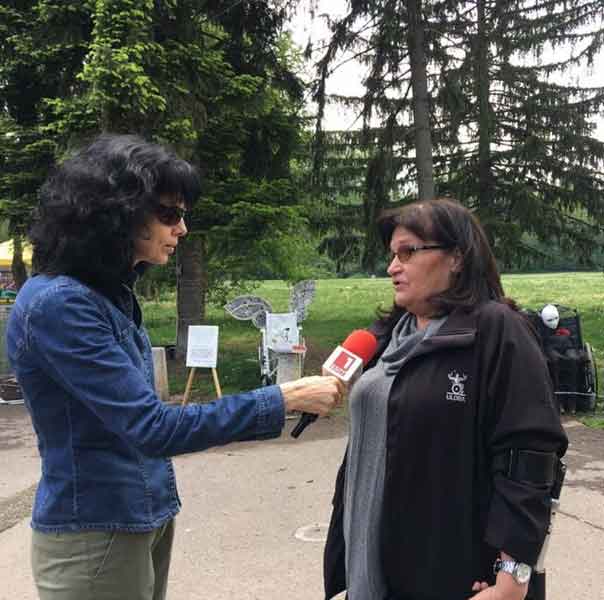
Lilie Angelova - Independent Researcher and project coordinator with ENIL
Kapka Panayotova was the main progressive influence in Bulgaria when it came to disability ideas and policies. She was the founder and the leader of the first, and so far the only, Centre for Independent Living in the country, established in 1995. She introduced in Bulgaria the ideas of the social model of disability and the independent living philosophy. She demanded rights, not charity for disabled people and fought for the development of genuine community services allowing disabled people to participate in the community, like everyone else.
One of Kapka’s dreams was to have a personal assistance service in Bulgaria. At the very beginning of 2000s, when personal assistance was completely unknown in Bulgaria, the Centre for Independent Living – Sofia started a pilot project aimed to develop a model, based on the experience of other countries. We visited Sweden and the UK – two of the pioneers of personal assistance and direct budgets – to see how the service is organised and how it works. We met with disabled people using the service, with organisations administering the service, with local authorities, with families and with all the knowledge and understanding we gained, we began the pilot. Unfortunately, while we were still piloting the service, the government started a national programme, which included provision of personal assistance among other services. However, this service was very different from what the independent living movement understands by personal assistance. Rather than supporting disabled people’s independence, the programme aimed to decrease unemployment rates and benefits expenditures and as a result, disabled people were reduced to passive recipients of care.
From this moment on, Kapka has been tirelessly and selflessly arguing and fighting for real personal assistance service in Bulgaria with all available means – from advocacy, through public campaigns and protests to legal cases. A big breakthrough came in 2007 when Sofia municipality started a personal assistance scheme, which allowed disabled people to have choice and control over the support. The model for the service was developed by Kapka and her colleagues at CIL-Sofia who successfully lobbied for its adoption. Not long after the start of the scheme, however, the municipality began making changes in the organisation and delivery of the service, which increasingly distanced it from the original idea. So, the struggle continued.
Kapka never ever stopped fighting for personal assistance and independent living, determined that disabled people in Bulgaria should have access to the service which has been so important for giving disabled people back control over their lives. She has been an inspiration for so many people in Bulgaria and around the world.
Kapka and the ENIL DI study visit to Stockholm 2016
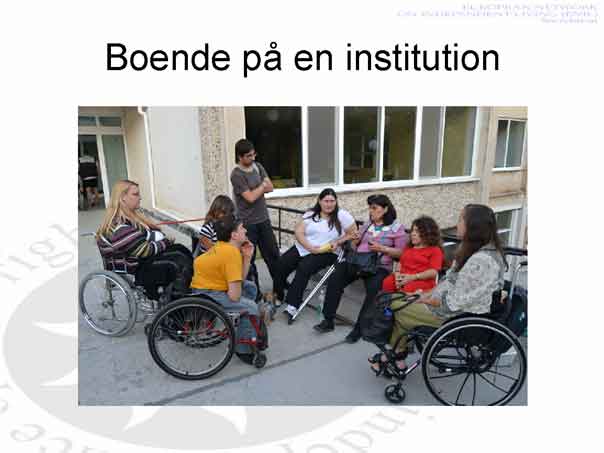
Through Independent Living Kapka Payayotova worked very hard for de-institutionalization (DI). She tried to influence the DI process in Bulgaria and in other EU countries. In 2016, she and Jamie Bolling were behind the organization of the ENIL study visit to Stockholm from Bulgaria, Spain, Lithuania and Germany with the goal to promote DI. The film: Institutions are Not Solutions: learning from the Swedish experience was produced from this event and is still relevant today. It can be seen at this link: https://www.youtube.com/watch?v=aFxYBZ2iXc4
One of the main messages is that many countries, in their process of DI and in closing larger institutions, are rehousing people in smaller facilities that are still institutions. People are not being supported for self-determination as required in the Article 19 of the United Nations Convention for the Rights of Peoples with Disabilities. People are disempowered not being able to make decisions. People are seen as sick and not as people who can live active lives.
This picture was taken during a visit at an institution in Bulgaria when Kapka and Jamie met those living there. Discussions were held on how they could try to leave the institution and find other living arrangements.
Kapka and TRIPs
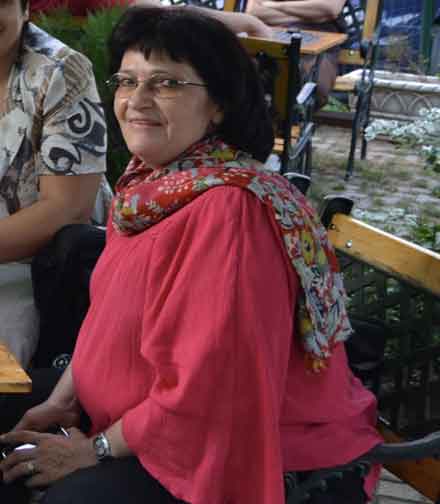
Kapka Panayotova led the Sofia Working group for TRIPS which a 3-year European project with European Network on Independent Living as a partner. TRIPs stands for: "TRansport Innovation for disabled People needs Satisfaction". The project was launched in the beginning of 2020 and is funded by the European Commission through Horizon 2020. The main aim of the project is to make the transport in seven European cities – Bologna, Brussels, Cagliari, Lisbon, Sofia, Stockholm, and Zagreb – more accessible for disabled people, elderly voyagers and the public in general. To do this, and in addition to ENIL, the project brings different people in each city together in co-production groups: organisations dealing with transport (UITP), accessibility and assistive technologies (AAATE), and design (TUE). It also includes partners with expertise in strategy and change management (TB), strategic technology development and user-centered design (DLR), and policy and regulatory advice on technologies (TRI). There is collaboration with local partners in the transport ecosystem (Zagreb City, CTM SPA, CARRIS, SRM).
In the City working groups, disabled people, transport providers, city councilors and other people involved in transport work together to find ways to make the transport in the city more accessible. Barriers are address that are commonly faced by users with and without disabilities in public transport. There is the plan to implement steps for having accessible transport solutions for the future.
By ratifying the UN Convention on the Rights of Persons with Disabilities, the EU and all Member States have committed to respect the rights of disabled people, including the right to mobility and independent living. In practice however, these rights have not yet been implemented in large parts of the EU and many of today’s transport systems remain inaccessible. Therefore, people are disabled from accessing job opportunities, education, social and leisure activities and other services. This limits lifestyle choices, reinforces exclusion from local communities, and ultimately blocks people from participating in society as full and independent citizens.
The TRIPS project will:
Propose a co-design approach that allows people, disabled by inaccessible environments, to take the leading role in designing accessible and useable transport systems. By focusing on the experience and needs of disabled people, the project aims to directly address a wide variety of barriers in current urban transport systems. This also includes barriers due to for example age, health, or language.
Provide case studies that show how such co-designed mobility solutions can indeed provide inclusive urban transport-for-all in seven example European example cities: Bologna, Brussels, Cagliari, Lisbon, Sofia, Stockholm and Zagreb.
The website of the project:https://trips-project.eu/
The deliverables: https://trips-project.eu/deliverables/
The Sofia working group has decided to work on the accessibility of the bus stops. It is now unsure on how the work will continue with the loss of Kapka.
Meeting of the DRD Nordic network
Save the date – February 2, 2022 – Time: 13:00 – 16:00 CET
This meeting is a follow up from the Nordic network meeting in November 2020. On the agenda we will have: Our work with the CRPD, Our work with PA, Hinders and Cooperation forward. Please confirm attendance to me by January 22, 2022 – jamie.bolling@independentliving.org. Thanks!
Your ideas for DRD planning
What would you like to see being done in the network? What kind of webinars would you like to be held? Any other ideas? Please write these in an email to jamie.bolling@independentliving.org
Closing note: Gerard Quinn – UN Special Rapporteur on the rights of persons with disabilities
"You always knew Kapka was in the room. Someone would make some dull pronouncement or other and she could always be counted on to make some short, sharp comments on the side. She had an unerring ability to bring matters down to earth, to remind people of the raw edges of human experience, to ground abstract analysis on human pain. Her voice was always a perfect antidote to the temptation to gloss over the human costs of change (or no change). Its’ amazing how many policy makers fall into the trap of accepting a concept of gradual change that is neither gradual nor change. Kapka always saw through that. She heard all the excuses. She could see through them. She was passionate about change. We loved her for that. I like to think that the struggle for independent and community living is part of a larger struggle for our common European home – a place where the human personality can flourish regardless of any difference including disability. This is not something new or fancy. It is deeply embedded in our European dream. Kapka lived that dream and kept it alive for the rest of us. Her passion was infectious – we are all walking in her shadow. We miss you and love you."
Gerard
A great thanks to all who have contributed to this newsletter. Best of wishes to all for the holiday season and a:
Happy New Year 2022

